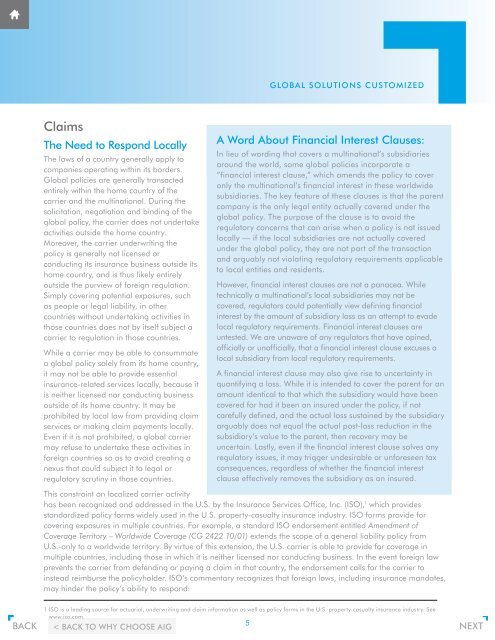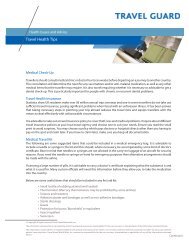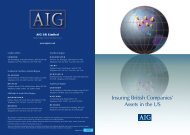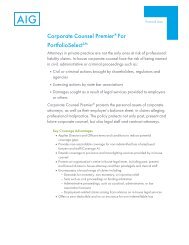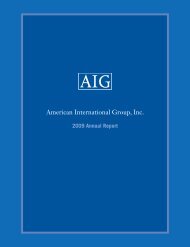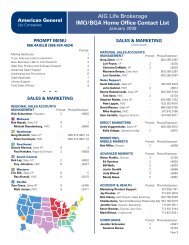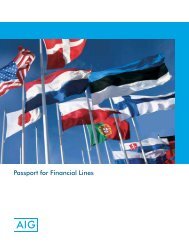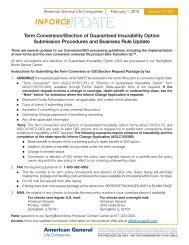fully interactive pdf - AIG.com
fully interactive pdf - AIG.com
fully interactive pdf - AIG.com
- No tags were found...
You also want an ePaper? Increase the reach of your titles
YUMPU automatically turns print PDFs into web optimized ePapers that Google loves.
GloBal SolutionS CuStoMizedClaimsthe need to Respond locallyThe laws of a country generally apply to<strong>com</strong>panies operating within its borders.Global policies are generally transactedentirely within the home country of thecarrier and the multinational. During thesolicitation, negotiation and binding of theglobal policy, the carrier does not undertakeactivities outside the home country.Moreover, the carrier underwriting thepolicy is generally not licensed orconducting its insurance business outside itshome country, and is thus likely entirelyoutside the purview of foreign regulation.Simply covering potential exposures, suchas people or legal liability, in othercountries without undertaking activities inthose countries does not by itself subject acarrier to regulation in those countries.While a carrier may be able to consummatea global policy solely from its home country,it may not be able to provide essentialinsurance-related services locally, because itis neither licensed nor conducting businessoutside of its home country. It may beprohibited by local law from providing claimservices or making claim payments locally.Even if it is not prohibited, a global carriermay refuse to undertake these activities inforeign countries so as to avoid creating anexus that could subject it to legal orregulatory scrutiny in those countries.a Word about Financial interest Clauses:In lieu of wording that covers a multinational’s subsidiariesaround the world, some global policies incorporate a“financial interest clause,” which amends the policy to coveronly the multinational’s financial interest in these worldwidesubsidiaries. The key feature of these clauses is that the parent<strong>com</strong>pany is the only legal entity actually covered under theglobal policy. The purpose of the clause is to avoid theregulatory concerns that can arise when a policy is not issuedlocally — if the local subsidiaries are not actually coveredunder the global policy, they are not part of the transactionand arguably not violating regulatory requirements applicableto local entities and residents.However, financial interest clauses are not a panacea. Whiletechnically a multinational’s local subsidiaries may not becovered, regulators could potentially view defining financialinterest by the amount of subsidiary loss as an attempt to evadelocal regulatory requirements. Financial interest clauses areuntested. We are unaware of any regulators that have opined,officially or unofficially, that a financial interest clause excuses alocal subsidiary from local regulatory requirements.A financial interest clause may also give rise to uncertainty inquantifying a loss. While it is intended to cover the parent for anamount identical to that which the subsidiary would have beencovered for had it been an insured under the policy, if notcare<strong>fully</strong> defined, and the actual loss sustained by the subsidiaryarguably does not equal the actual post-loss reduction in thesubsidiary’s value to the parent, then recovery may beuncertain. Lastly, even if the financial interest clause solves anyregulatory issues, it may trigger undesirable or unforeseen taxconsequences, regardless of whether the financial interestclause effectively removes the subsidiary as an insured.This constraint on localized carrier activityhas been recognized and addressed in the U.S. by the Insurance Services Office, Inc. (ISO), 1 which providesstandardized policy forms widely used in the U.S. property-casualty insurance industry. ISO forms provide forcovering exposures in multiple countries. For example, a standard ISO endorsement entitled Amendment ofCoverage Territory – Worldwide Coverage (CG 2422 10/01) extends the scope of a general liability policy fromU.S.-only to a worldwide territory. By virtue of this extension, the U.S. carrier is able to provide for coverage inmultiple countries, including those in which it is neither licensed nor conducting business. In the event foreign lawprevents the carrier from defending or paying a claim in that country, the endorsement calls for the carrier toinstead reimburse the policyholder. ISO’s <strong>com</strong>mentary recognizes that foreign laws, including insurance mandates,may hinder the policy’s ability to respond:1 ISO is a leading source for actuarial, underwriting and claim information as well as policy forms in the U.S. property-casualty insurance industry. Seewww.iso.<strong>com</strong>.5


